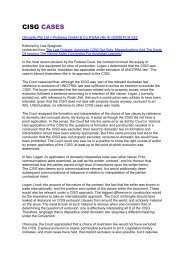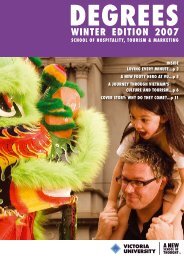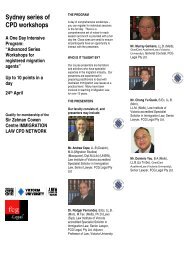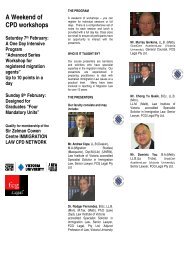A Glimpse Through the Kaleidoscope - Faculty of Business and Law ...
A Glimpse Through the Kaleidoscope - Faculty of Business and Law ...
A Glimpse Through the Kaleidoscope - Faculty of Business and Law ...
You also want an ePaper? Increase the reach of your titles
YUMPU automatically turns print PDFs into web optimized ePapers that Google loves.
LISA SPAGNOLO<br />
who face increasing numbers <strong>of</strong> scenarios in which a more powerful Chinese party<br />
might insist on <strong>the</strong> CISG (directly or indirectly).<br />
This may indeed already be slowly happening. Arguably, <strong>the</strong> trend should be felt most<br />
in nations trading most with China. Across time, U.S. opt-outs might be slowly<br />
decreasing. 74 Pr<strong>of</strong>essor Flechtner commented in 2007 that more „front end‟ queries<br />
from U.S. lawyers have been coming his way, ra<strong>the</strong>r than simply litigation queries. 75<br />
This could simply be a result <strong>of</strong> o<strong>the</strong>r fragments within <strong>the</strong> kaleidoscope: U.S. lawyers<br />
might now be more familiar for reasons unrelated to Chinese bargaining strength.<br />
Perhaps it is a combination <strong>of</strong> factors.<br />
However, I would suggest that <strong>the</strong> main driving force behind this shift is <strong>the</strong><br />
bargaining strength <strong>of</strong> China. That conclusion finds some support in recent reports <strong>of</strong><br />
trends away from opting out in nations o<strong>the</strong>r than <strong>the</strong> U.S., where opt-outs are still<br />
prevalent, such as Germany <strong>and</strong> Italy. 76 There are also comments in various empirical<br />
surveys <strong>and</strong> anecdotal accounts indicative <strong>of</strong> a preference for <strong>the</strong> CISG where <strong>the</strong> only<br />
o<strong>the</strong>r alternative acceptable to <strong>the</strong> dominant counterparty was Chinese law, 77 or when<br />
dealing with European, particularly German, counterparties holding a stronger<br />
bargaining position. 78 Although similar patterns <strong>of</strong> compromise are seen elsewhere<br />
when <strong>the</strong> domestic law is unacceptable for some reason, 79 in China‟s case it is <strong>the</strong><br />
74<br />
75<br />
76<br />
77<br />
78<br />
79<br />
152<br />
Note <strong>the</strong> change from 71% in 2004 to 61% or 55% in 2006-7): Koehler, M. F., “Survey regarding <strong>the</strong><br />
Relevance” supra fn 1; Philippopoulos, G. V., “Awareness <strong>of</strong> <strong>the</strong> CISG” supra fn 2; Fitzgerald, P. L.,<br />
“The International Contracting Practices” supra fn 2. Alternatively, differences could simply be due to<br />
survey design, sample composition (e.g. Philippopoulos targeted litigators), but are not attributable to<br />
sample size (48, 46 <strong>and</strong> 47 respectively): ibid.<br />
Flechtner, H. M., “Changing <strong>the</strong> Opt-Out” supra fn 22: noting in <strong>the</strong> US pressure exerted by<br />
globalisation <strong>of</strong> legal services markets <strong>and</strong> observing a „change‟ in queries he received from<br />
practitioners regarding CISG from purely litigious to front end (drafting/choice <strong>of</strong> law) queries.<br />
A recent anecdotal report is that while opting out is still prevalent in Italy, many specialist drafters are<br />
now choosing not to opt out: see Torsello, M., “Italy” supra fn 10, at pp. 189, 190, <strong>and</strong> 195-99. It seems<br />
a similar trend is appearing in Germany, where Magnus reports <strong>the</strong> impression that an increasing number<br />
<strong>of</strong> business associations no longer generally recommend opting out, <strong>and</strong> that opting out is no longer <strong>the</strong><br />
norm for st<strong>and</strong>ard forms: Magnus, U., “Germany” supra fn 4, at p. 146.<br />
One US practitioner commented that „[p]articularly in Chinese transactions, <strong>the</strong> CISG will apply to <strong>the</strong><br />
international contract‟: Fitzgerald, P. L., “The International Contracting Practices” supra fn 2, at p. 106.<br />
In ano<strong>the</strong>r study, a US practitioner stated that „he prefers <strong>the</strong> CISG when contracting with Chinese firms<br />
because CISG is more easily underst<strong>and</strong>able than <strong>the</strong> Chinese law alternative‟: Philippopoulos, G. V.,<br />
“Awareness <strong>of</strong> <strong>the</strong> CISG” supra fn 2, at p. 364.<br />
At least 2 US practitioners mentioned such situations: Philippopoulos, G. V., “Awareness <strong>of</strong> <strong>the</strong> CISG”<br />
ibid.<br />
„Sometimes […] a country‟s domestic law is less acceptable to <strong>the</strong> opposing party than <strong>the</strong> CISG‟:<br />
Ferrari, F., supra fn 15, at p. 430 <strong>and</strong> fn.102 (Denmark <strong>and</strong> China); Baretić, M. <strong>and</strong> Nikšić, S., “Croatia”<br />
supra fn 10, at p. 95 (Croatia). Japanese companies prefer to have <strong>the</strong> „CISG applied than to be governed<br />
by a foreign law which is not necessarily refined <strong>and</strong> satisfactory by Japanese legal st<strong>and</strong>ards‟:<br />
Hayakawa, S., “Japan” supra fn 10, at p. 226. Han partially attributes low opt-out levels in China to <strong>the</strong><br />
perception that <strong>the</strong> CISG is considered more „acceptable‟ in transactions with non-Chinese parties than<br />
Chinese contract law: Han, S., supra fn 6, at pp. 71-72; Koehler, M. F., <strong>and</strong> Guo, Y., “The Acceptance<br />
<strong>of</strong> <strong>the</strong> Unified Sales <strong>Law</strong>” supra fn 6, § V: reporting one Chinese practitioner‟s response that it was<br />
easier to persuade foreign parties to designate CISG.<br />
(2009) 13 VJ 135 - 156
















